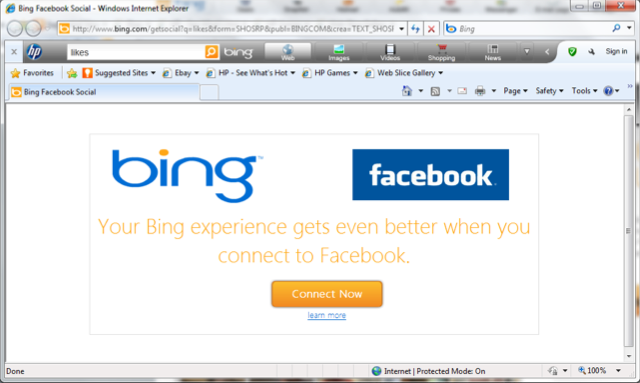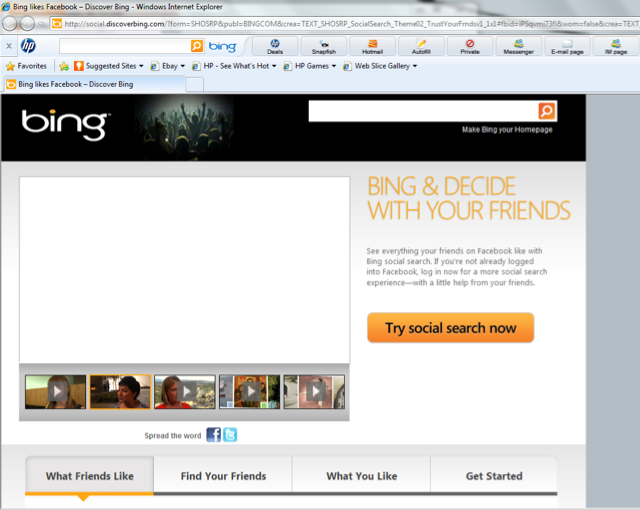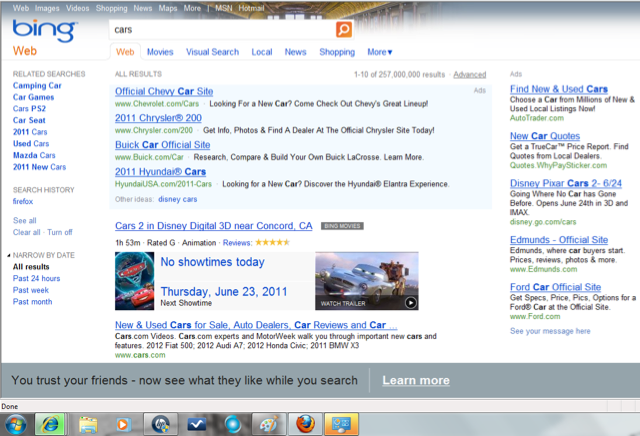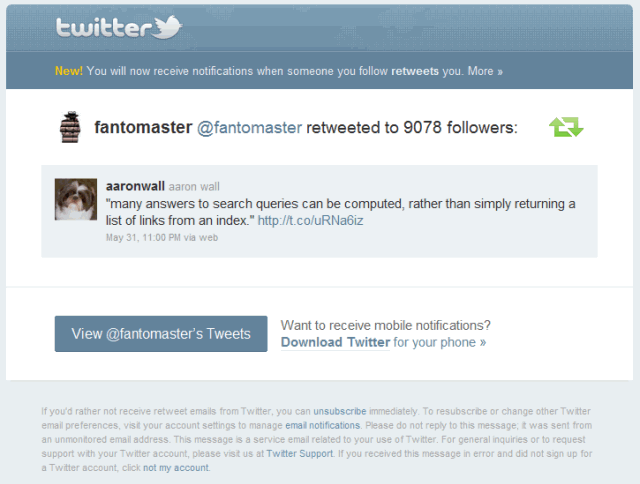Social Spam Required by Bing & Google
If the social sites were isolated I would comfortably ignore them as a waste of time. Unfortunately, search engines are convinced there is signal to be had on social networks (in spite of how easy they are to game with promotions).
If I wasn't super busy I would run one such promotion to prove my point, but I am already drowning in email.

Bing + Facebook
Bing is pushing Facebook integration everywhere. TV ads, on the search results, etc.



"Open" Cultural Revolution
Shortly after gutting RSS & making authentication harder (to lock down their "open" platform) Twitter announced they were going to test in-stream ads & turned on sending out automated email spam.
Awesome.

How valuable is that email? How about "not at all" for $500 Alex?
I think Fantomaster is brilliant, but I would much rather read one of his blog posts that dozens or hundreds of Tweets. Sure knowing that 9,000 might have saw a message can be comforting, but 1 blog post will get you way more views (and with far deeper context & meaning).
How to Test the Value of Social Media
Want to see big numbers get small quickly? Try charging anything...as little as $1 & you will quickly see that social media is mostly garbage. Alternatively, try giving away $5 or paying for the in-stream ads that directly manipulate relevancy & once again you will see how worthless social media is as a signal...something that anyone can quickly buy.
Even scientists (who typically pursue the truth even if it is uncomfortable) are considering investing in manipulating their online reputation:
Online reputation is important to most researchers, and about 10% of respondents to our survey complained that they or their work have been misrepresented on the Internet. The web has a long memory, and rumours, lies and bad information can spiral out of control to be remembered by posterity.
Implementation Tips
For a lot of businesses the social media stuff will be nothing but blood & tears. A resource drain that money, time & hope gets poured into with nothing coming out the other end.
That said, I don't think ignoring it is a wise decision at this point. The best tip I have for most people is to try to set up automated systems that help your social signal grow automatically. That can mean onsite integration & perhaps a small token amount of advertising. Beyond that it is probably only participating as much as you enjoy it. And if you are more of a huckster/PR type, pay attention to how folks like Jason Calacanis leverage these channels.
The second best tip would be measure it with stats that actually matter. Revenue and profit are important. Time spent tracking the number of retweets is probably better spent building more content or improving your business in other ways. If you have something that works the rabbit hole goes deep, but if it isn't working then it is likely better spending your time being a bigger fish in a smaller pond.
Inspired by Barry's implementation, we recently added the social buttons to the left rail of the site. That is probably one of the best types of integration you can do, because it is out of the way for those who don't know what it is and/or want to ignore it, but it stays right in the same spot (always visible) for anyone who is interested in those types of buttons.
What Makes the Web Great (for Small Businesses)
Two things that make the web great are the ability to fail fast (and cheaply) & the ability to focus deeply. If social media increases the operating cost (being yet another hoop you have to jump through) & robs valuable attention that could go into your website then it is 0-for-2.
Sure there will be some edge case successes (like luxury brands maintaining their positions), but success from newer & smaller players will be uncommon exceptions (often operating outside the terms of service).
Google Leveraging Search to Push Social Junk
Google is pushing hard on identity to try to make search more social, with authorship markup & author highlighting within the search results.
It remains to be seen if an author will be able to carry his or her trust with them to their next gig, but if they can then that would make the media ecosystem more fluid & pull some amount of power away from traditional publishers. Some publishers are suggesting putting their book content online as HTML pages...well if they are doing that then why doesn't the author just install Wordpress and keep more of the value chain themselves (like J.K. Rowling just did)?
Google launched their Google+ social project & their +1 votes increase organic CTR (but highlighting that trend with "analytics" is almost like it is out of "Lying with Numbers" as one would expect a higher CTR since those who "vote" for you are more likely to be fans, who tend to be repeat visitors to your site ... which is exactly why we get more search traffic from Google for "seo book" than we do for "seo").
Google emailed AdWords advertisers encouraging them to mark up their pages with +1 & inside the AdSense interface Google also offers +1 integration tips:

The AdWords help files state clearly that +1 *is* a search relevancy signal:
+1's (whatever their source -- organic search, ads, or +1 buttons on publisher sites) is a signal that affects organic search ranking, but +1's do not change quality scores for ads and ad ranking.
Like any of the brand-related signals Google has been leaning into for the past couple years, the +1 button will favor big brands.
The impact & effect is so obvious that Google's help docs contain the following question: "Will the +1 button make it harder for my small business to compete with larger companies?"
Their answer to that question is generally "no" but that they would even ask themselves that question is fallacious Orwellian duplicity.
Would you trust the local plumber to work on your house if he was posting "exciting viral content" online about how some projects went astray? Now every plumber needs to become a marketing expert to not get driven off the web by Roto-Rooter & other chain-styled companies that can collect +1 signals from all their employees & some of their customers across the country or around the world.
Google knows they are tilting the search game toward those who have money. They even flaunt it in their display ads!

Google claimed that facial recognition was evil so that they could make Facebook look bad, but if you listen to Google for long enough you will see that they claim the opposite of their recent claims whenever it is convenient:
Google itself explains that not allowing its device maker partners to ship Skyhook's software was just, the way Google describes it, a necessary measure to prevent damage (Google says "detriment", which is the Anglicized version of the Latin word for "damage") from being caused to the whole ecosystem.
But Google does not want to allow Oracle to control Java the way Google controls Android.
Google today is saying that "social media is important." Just look at their wave of product announcements & their bonus structure.
I loathe the approach (and the message), but I accept it. ;)




Comments
Back links are a form of social quality indicator. I think Google is trying to achieve the same with social media.
My primary view of the web is based on "ok, how does this impact independent webmasters & small mom + pop businesses" ... and a lot of this social garbage is not good for most of them from a competitive standpoint (they have to wear more hats, attention gets pulled in more directions, and they have to jump through hoops to manufacture signals that can basically automatically be created by larger companies simply by sending out a company memo email and riding the nepotism from the large staff voting for itself).
The brand bias of it all is so flagrant that Google sees a need to ask itself a question about that issue & deliver a bogus response to it.
And the above post didn't even mention things like out-of-context slander, ad networks (or similar) that collect reviews and then force you to buy ads if you want to clean up the profile, ad networks that prefer to work with a few larger partners who have more leverage over the supply chain, search engines doing a scrape & replace approach on things like reviews & product information, etc etc etc
Arron, I hear what you are saying, and you know much more about this than anyone I know. But, will this work?
"ok, how does this impact independent webmasters & small mom + pop businesses" Right on! . So let look at the smaller business. Not a Internet based business but an off line business who is forced to compete on the Internet. These are the plumbers, auto mechanics and most of American small business.
The cannot produce quality content to get links. They cannot get these social signals. Its beyond their financial means and marketing understanding. But their customers still want to find them. If Google raises the bar to high (many believe they have) then these people are locked out and the searchers can't find them. If Google's customers can't find the people they want (many complaints already) then what will happen?
Because lets be realistic. According to this scenario a large percentage of the small business will be shut out. Now if the searchers can't find who they want, what will happen? Will they go to other search engine that have a way to list small business? Will we see regional portals like the old print yellow pages? Will people use social contacts like shouting on facebook "Anybody know a good plumber?" Maybe a small business search engine will pop up. Many all of these things. I don't know the answer but I see how ebay has changed retailing, Craigslist has killed print ads, Skype has killed long distance, Email has killed first class mail. There have been so many disruptive technologies that have destroyed markets, perhaps there will be one that impacts search like this. I believe Google will do exactly as you say. I don't believe it will work in the long run.
Google's move to increase localization did throw a bone by lowering the bar for some small local businesses (though Panda did no favors to small ecommerce players, especially as it boosted the biggest players)...but I do think that over time as these other "signals" are developed & saturated they will once again drive more small businesses out of the market. That said, when some fall away that will make some of the remaining ones stronger. So there will be fewer success stories, but some of those individual stores that grow more successful will eventually create chains.
If businesses are driven into bankruptcy then consumers won't know what they are missing & certainly will not be able to tie it back to Google.
The trick is a competitor will have to be willing to push a public relations campaign highlighting the issue. But I don't know how anyone does so credibly unless they come from a far different angle. Bing is trying to work in China, so Google could spin that on them. Yahoo! outsourced search. Ask, AOL & Blekko all carry Google ads (and the first 2 rely on them algorithmically to some level too). Foreign search engines like Naver, Yandex & Baidu are strong in their local markets, but will have trouble spreading far outside of them due to cultural or branding issues.
Some of the business owners may be stuck becoming employees or managers of local offices of nationwide chains that they competed against in the past.
I think the hard part is that most people will not realize what they are missing. You or I can look at this SERP and see it for what it is. But most consumers do not realize when a company owns multiple brands in the same market.
IMHO this is primarily an issue of branding. But if Google starts losing a public relations issue in the press they will manage to adjust and reframe it...just look at how the press was writing about how how Google was fighting evil publishers & making the web better, all the while failing to mention that Google AdSense (and Google's policies with it) are what funded those "evil spammers."
This I highly doubt due to what Google has done to those companies. I think the best chance of something like that taking off would be if some of them were built from the bottom up using the "we are local" from real people who live locally...think a merger of independent news organization + local directory combination.
There might be some of that, but many issues are embarassing and/or personal and/or require finance & such to where people may not want to mention them. Sure this model is (& will continue) doing well in areas like restaurants, but certain types of health or legal issues won't have much word-of-mouth.
The hard part here is having enough money to market it...the biggest companies have the biggest ad budgets, which give the search engines that serve them the fattest margins.
I do think you are right that there are a lot of ways for things to still evolve though. Google's biggest problem going forward is the need to be all things to all people, and how they are spreading their brand in so many different directions.
Hi Aaron,
Although it's far less elegant, I wrote a post on a very similar topic recently from the point of view of a marketer (ie. not an SEO expert).
http://ensignjenpersonallog.wordpress.com/2011/06/15/google-should-we-be...
I currently work for a company that is a relatively small business (compared to many) and we're taking our first tentative steps into social media. In honesty, I may not have recommended this avenue for us, but at the moment, it feels like we don't have a choice.
Way to work "wave" in to the next to last sentence :)
Always fun writing in layers. Though I must confess that one wasn't intentional...it does make it so much better though! ;)
I'm not ashamed to say that I hate the "social" web. It is basically an expansion of the worst facets of PURE democracy (i.e. if 51% of people vote to ban ice cream, then it's banned)
The flagrant buying and selling of "social" signals clearly spells out how little people can really count on the accuracy of these social tools. Almost every company I do business with is offering discounts for Facebook likes, tweets etc.
I understand why, though.
My least favorite part of the new "social" is how it requires a response from business even when none is deserved. When some nutjob emails me a poorly written email requesting hours of my time for free even when they've never purchased a thing from me (freetard?) I can choose to ignore it. But now, these same people can badmouth a business on Facebook, twitter, etc.
I actually had a guy ask for a discount "or else he'd have to say something unpleasant on Facebook" about me. I told him what pier to walk off.
I can't help but feel like the new "social" is just mob rule. The web has always been open where anyone can start a site or blog or forum and have their say. The "social" web allows anyone to trade on the branding of huge sites like facebook etc. This can be incredibly empowering and also incredibly frustrating.
I'm hoping the "social" web matures a bit more.
... all the "notes" pages on Facebook. There is a lot of SERP arbitrage going on there!
So not only are the social sites a platform for extortion threats, but they are also parasitic hosting platforms.
If these sites are so important and valuable and world-changing then why did MySpace sell for only $35 million? Recall that some cheesy Wordpress blogs that were niche SEO plays have sold for $5 to $15 million.
In terms of the platforms being "open" of course that is a farce as well, with the FTC now looking into Twitter.
There may be a time in the not-so-distant future where social is really useful in search, but I don't see it yet. I totally agree with the sentiments of the post, Aaron, as well as what NeonDog said: social media is mob rule. There are entire marketplaces for buying retweets, +1's, etc. The only ones who benefit from this are big brands and those with big budgets.
*shrugs*
What is your thought on the firehose thing Google don't want to pay for anymore?
...that Google didn't want to pay for it, it might be that Twitter thought since Google offers a real-time search option they thought they could price gouge Google on it & Google said no thanks. Google played the "over-pay & subsidize a social network" game with MySpace. Paying a billion Dollars for junk traffic only to see the site that billion Dollar traffic stream came from later sell for $35 million must have been quite a hard kick in the nuts to Google.
Add new comment